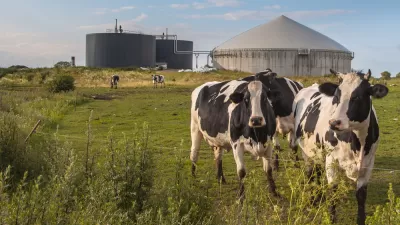Next month the Los Angeles County Metropolitan Authority will decide what type of buses to purchase to replace 1,000 aging diesel buses. Two op-eds in the Los Angeles Daily News present alternative viewpoints.

The debate begins with an op-ed on March 23 by Patricia Larcara (quoted and pictured in this New York Times article), a Porter Ranch resident in the San Fernando Valley region of the city of Los Angeles, site of the largest methane leak in U.S. history, first detected in October 2015.
The debate between gas and electric has been going on for decades. But for me, the choice is simple.
As a resident of Porter Ranch for 28 years, the methane leak at the Aliso Canyon storage facility left me shaken on many levels. Besides my health and my livelihood, what was most shaken was my faith that oil and gas companies would protect the neighborhoods......
That’s why it’s so critical that the Los Angeles County Metropolitan Transportation Authority (Metro) gets serious about switching 100 percent of Los Angeles’ buses to electric vehicles instead of continuing our dangerous reliance....
The opposing viewpoint, posted April 8 by Marcus Gillette, director of public and government affairs for the Coalition for Renewable Natural Gas, supports the compressed natural gas buses, presumably similar to these "30 next-generation, near zero-emission compressed natural gas buses" purchased by Metro in October, funded in part with a $10.5-million U.S. Department of Transportation grant. However, his op-ed is oriented not to the buses but to the fuel they will use.
The fact is, a predominant percentage of the geologic natural gas fueling transportation fleets in California has been replaced by renewable natural gas — produced from the decomposition of organic materials that is captured (avoiding greenhouse gas emissions and short-lived climate pollution) and conditioned to meet transportation fuel specifications.
Unlike geologic natural gas, renewable natural gas is not produced from hydraulic fracturing (fracking). Renewable natural gas is produced entirely from the methane emitted as organic materials decompose in renewable waste streams. It can then be injected into the existing common carrier pipelines and deployed through natural gas fueling stations, displacing CNG or LNG in medium- and heavy-duty vehicles like Metro’s busses......
The comparison between renewable and geologic (or fossil) natural gas applies to diesel fuel as well. In San Francisco, the city switched from using biodiesel, a blend of conventional (fossil) diesel fuel and a bio-fuel, to using 100 percent renewable diesel, according to a December 2015 post that describes the difference between biodiesel and renewable diesel.
The Sierra Club has aligned itself with the electric buses advocates. However, they don't distinguish between what they call "polluting" or "dirty" natural gas, a description that conflicts with Metro's description, and renewable natural gas.
FULL STORY: For L.A. Metro, natural-gas buses are clean and simple choice: Guest commentary

Planetizen Federal Action Tracker
A weekly monitor of how Trump’s orders and actions are impacting planners and planning in America.

Congressman Proposes Bill to Rename DC Metro “Trump Train”
The Make Autorail Great Again Act would withhold federal funding to the system until the Washington Metropolitan Area Transit Authority (WMATA), rebrands as the Washington Metropolitan Authority for Greater Access (WMAGA).

The Simple Legislative Tool Transforming Vacant Downtowns
In California, Michigan and Georgia, an easy win is bringing dollars — and delight — back to city centers.

The States Losing Rural Delivery Rooms at an Alarming Pace
In some states, as few as 9% of rural hospitals still deliver babies. As a result, rising pre-term births, no adequate pre-term care and "harrowing" close calls are a growing reality.

The Small South Asian Republic Going all in on EVs
Thanks to one simple policy change less than five years ago, 65% of new cars in this Himalayan country are now electric.

DC Backpedals on Bike Lane Protection, Swaps Barriers for Paint
Citing aesthetic concerns, the city is removing the concrete barriers and flexposts that once separated Arizona Avenue cyclists from motor vehicles.
Urban Design for Planners 1: Software Tools
This six-course series explores essential urban design concepts using open source software and equips planners with the tools they need to participate fully in the urban design process.
Planning for Universal Design
Learn the tools for implementing Universal Design in planning regulations.
Smith Gee Studio
City of Charlotte
City of Camden Redevelopment Agency
City of Astoria
Transportation Research & Education Center (TREC) at Portland State University
US High Speed Rail Association
City of Camden Redevelopment Agency
Municipality of Princeton (NJ)



























